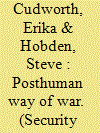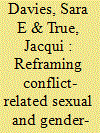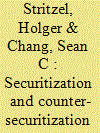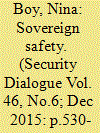|
|
|
Sort Order |
|
|
|
Items / Page
|
|
|
|
|
|
|
| Srl | Item |
| 1 |
ID:
142496


|
|
|
|
|
| Summary/Abstract |
Recent interventions from a ‘posthumanist’ or ‘new materialist’ perspective have highlighted the embedded character of human systems within a ‘panarchy’ of human and non-human systems. This article brings attention to a very particular element of materiality, one with a profound significance for issues of security – relations between human and non-human animals in instances of conflict. It is an indication of the deeply human-centred character of both international relations and security studies that almost none of the central texts mention the very significant roles that non-human animals have in the conduct of war. We argue that the character of war would have been radically different but for the forced participation by an enormous range of non-human animals. Even though, with the improvements in transportation over the last century, non-human animals are less evident in the context of the movement of people and equipment, they still play a significant number of roles in the contemporary war-machines of wealthy countries. Drawing on literature from critical animal studies, sociology and memoirs, this article discusses the enormous variety of roles that non-human animals have played in the conduct of war, and examines the character of human–non-human animal relations in times of war.
|
|
|
|
|
|
|
|
|
|
|
|
|
|
|
|
| 2 |
ID:
142495


|
|
|
|
|
| Summary/Abstract |
Over the past decade, significant global attention has been paid to the issue of ‘widespread and systematic’ sexual and gender-based violence (SGBV). To contribute to the prevention of SGBV, researchers have examined the relationship between the presence of armed conflict and the causes of SGBV. Much of this causal literature has focused on the individual and group perpetrator dynamics that fuel SGBV. However, we argue that research needs to lay bare the roots of SGBV in normalized and systemic gender discrimination. This article brings back structural gender inequality as a causal explanation for SGBV. In order to better understand and prevent SGBV, we propose a critical knowledge base that identifies causal patterns of gendered violence by building on existing indicators of gender discrimination.
|
|
|
|
|
|
|
|
|
|
|
|
|
|
|
|
| 3 |
ID:
142498


|
|
|
|
|
| Summary/Abstract |
This article confronts securitization theory with the war in Afghanistan and thus explores questions and dynamics of securitization in a specific communicative situation of military combat. The confrontation highlights not only less well researched questions of implementation, resistance, legitimacy and difficulties of establishing authority in securitizations, but it also inspires a conceptualization of counter-securitization within the theory. In Afghanistan sovereign power to control and realize a securitization at the implementation stage was significantly fragmented so that processes of securitization became more iterative and interactive, and acts of acceptance versus resistance with regard to securitizing moves were more complex than traditionally assumed by the theory. Reflecting on securitization theory, the article thus explores the case of Afghanistan through a conceptualization of its dynamics as a prolonged political game of moves and counter-moves marked by securitizing and counter-securitizing speech acts in which the communicative situation of war becomes visible as a process of strategic interactions in continuous sequences of action and reaction.
|
|
|
|
|
|
|
|
|
|
|
|
|
|
|
|
| 4 |
ID:
142499


|
|
|
|
|
| Summary/Abstract |
This article explores maritime protection zones (MPZ), which are being created in the territorial waters of a number of European states. Through the work of Gaston Bachelard and Peter Sloterdijk, the article analyses maritime zonation as a paradigmatic global security mechanism. It examines how maritime spatial planning seeks to reconfigure sea-space into multi-dimensional spheres of predictability and rationality. These processes, it proposes, seek to routinize the use of sea-space and reconcile tensions between the governance of land and sea, and between fixed infrastructure and mobile capital flows. The political and economic redistribution at stake in the construction of a global network of vast maritime zones, which act as hubs of wealth creation and environmental management, creates further tensions where commercial and military security imaginaries meet local and ecological interests. The article traces the ontology of multi-dimensional zonation and concludes that space which emerges from a pluralist and less anthropocentric understanding of the maritime would provide more effective security.
|
|
|
|
|
|
|
|
|
|
|
|
|
|
|
|
| 5 |
ID:
142497


|
|
|
|
|
| Summary/Abstract |
This article traces the contours of an inconspicuous kind of state power in the form of sovereign safety. This power is articulated, more precisely, in a combination of four elements: the historical term of public credit, the liquid government bond, the risk-free asset of financial textbooks and the safe-haven function assumed by the bond market in times of uncertainty. All of these involve a peculiar translation from sovereign debt as the most risky asset to sovereign creditworthiness, circulating unsecured. If critical security studies has largely limited itself to a critique of the relatively recent sense of political state security, this article explores the relevance of a far older financial sense of ‘security’ and ‘securitization’ for contemporary studies of security. So far, the Foucault-inspired finance–security literature has emphasized the risk calculus as a principal mechanism in ‘securing circulation’. This article argues that sovereign safety constitutes an important overlooked factor in securing circulation in two ways: As the main form of collateral for financial transactions, its capacity to secure derives from being considered secure itself. As an epistemic variable, it constitutes the bedrock of modern finance theory. Moreover, rather than neatly complementary to the liberal security dispositif, sovereign safety can to some extent be said to represent the very object of the Foucaultian divesture of power.
|
|
|
|
|
|
|
|
|
|
|
|
|
|
|
|
|
|
|
|
|